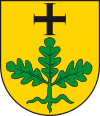Tolkemit
| Tolkmicko | ||
|---|---|---|
 |
||
|
||
| Coordinates: 54°19′14″N 19°31′50″E / 54.32056°N 19.53056°E | ||
| Country |
|
|
| Voivodeship | Warmian-Masurian | |
| County | Elbląg | |
| Gmina | Tolkmicko | |
| Area | ||
| • Total | 2.28 km2 (0.88 sq mi) | |
| Population (2006) | ||
| • Total | 2,731 | |
| • Density | 1,200/km2 (3,100/sq mi) | |
| Postal code | 82-340 | |
| Climate | Dfb | |
| Website | http://www.tolkmicko.pl | |
Tolkmicko [tɔlkˈmit͡skɔ] (German: Tolkemit) is a town in northern Poland, on the Vistula Lagoon, about 20 km northeast of Elbląg. It is located in Warmian-Masurian Voivodeship, in Elbląg County. Its population is 2,766 (2004)
The site was first settled by Old Prussian tribes. The city law (Stadtrecht) followed the incorporation of the territory into Prussia in 1296 and was based on the German Kulm law (Kulmer Recht) by order of Ludwig von Schippe, then commander of the Teutonic Knights. On 21 March 1351 the Grand Master of the Teutonic Knights Heinrich Dusemer renewed the municipal law and together with the village of Neuendorf (now Nowinka) Tolkmicko obtained fishing legislation. In 1390 Peter Turnow, the Theologian later burned at the stake as a heretic in 1426, was born here.
On 3 April 1440 it became part of the Prussian Confederation. In 1466, after the Second Peace of Thorn, the town became part of the autonomous Polish Prussia, which was associated with the Kingdom of Poland.
In 1525, during the Reformation, the Church property formally became the parish church Tolkemit Evangelical Lutheran church. This was undertaken by a former monk named Bommler, son of the mayor of Tolkemit. The town however remained in the Roman Catholic Bishopric of Warmia and thus remained subject to Catholic rule. After 1569 the special legal position of Polish Prussia within royal Poland was slowly undermined, and the town was formally absorbed into Poland proper in 1572.
...
Wikipedia


